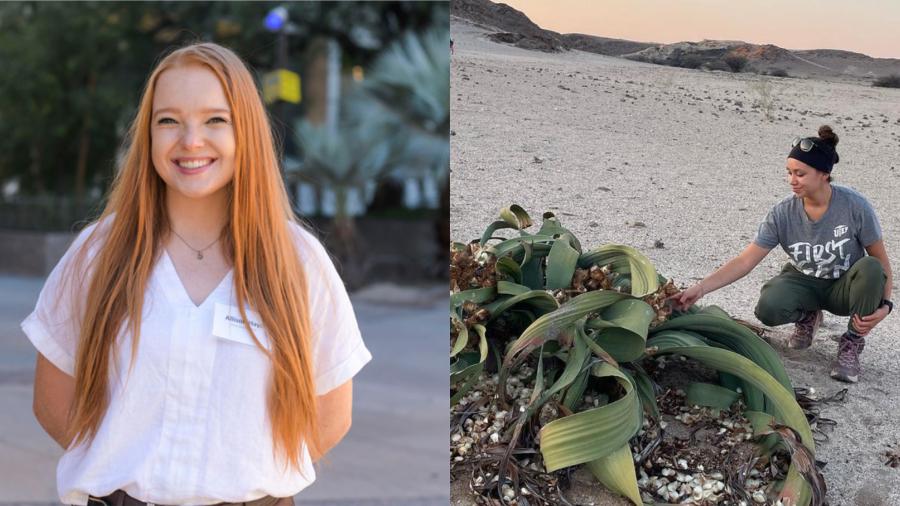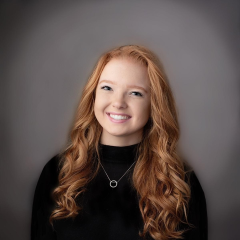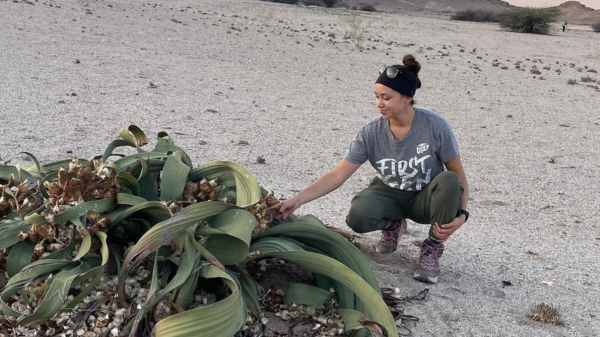Souls of SOLS, October 2024: Highlighting Graduate Student Stories
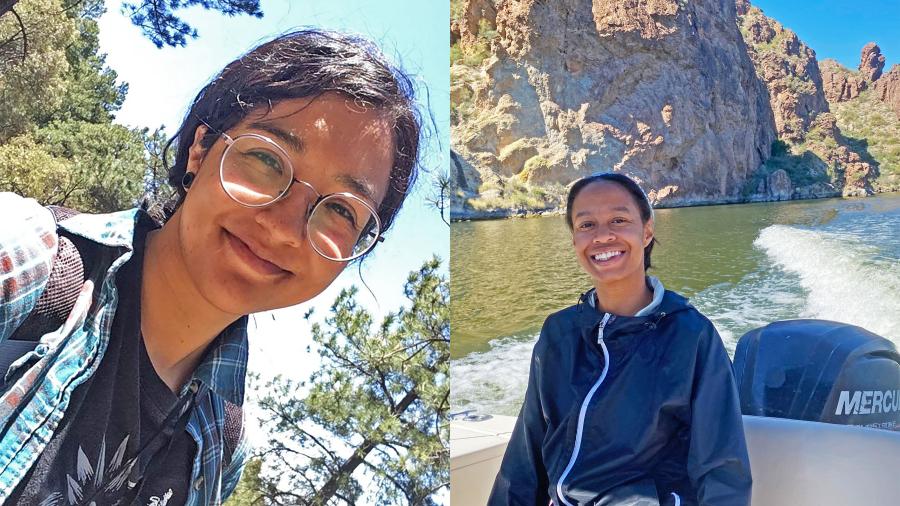
Sofía González Salazar, on the left, is a PhD candidate in the Evolutionary Biology program. Ashley Foster, on the right, is a PhD candidate in the Environmental Life Sciences Program.
Note: This story is part of an ongoing series profiling graduate students in the School of Life Sciences. See September's featured students here.
Sofía González Salazar – Evolutionary Biology PhD
To the average person, thinking about mites is not a pleasant experience. Sofía González Salazar, though, is not the average person.
The fifth year PhD student has dedicated years of her life now to studying the tiny creatures, and even has a mite tattoo on her chest. She smiles dreamily at the mere thought of them: “They’re like little aliens that exist in our own world. I love them.”
Salazar studies the populations of mites that exist in the sky islands of the Sonoran Desert. “Sky islands” aren’t really floating islands, but they’re close. The conifer forests on Sonoran Desert mountaintops are geographically isolated; once you descend the mountain, you’re back in the uninhabitable desert. That makes those little patches of forests essentially like a series of floating islands that species would have to hop between to migrate.
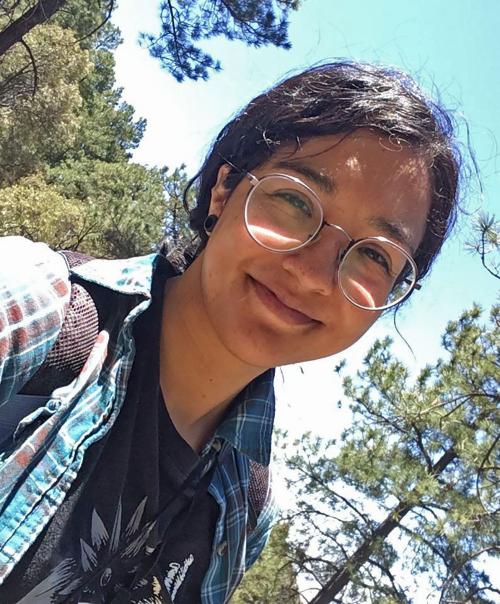
Tens of thousands of years ago, the sky islands were connected by conifer forests that covered the region. But as the region turned into desert, the species that lived in the forests took refuge in high altitudes. By looking at what mite species live in the sky islands, Salazar can begin to guess at how different species of mites migrated thousands of years ago.
But Salazar isn’t just trying to figure out the past, she’s interested in finding out what mites exist in which parts of the sky islands in the present. Though that might sound like a straightforward question, it’s something that no other scientist has done before; the microscopic mites have been understudied and overlooked.
“A lot of people don’t want to work with [mites], because they’re not the most important thing in terms of medicine or ecology,” Salazar explains, “That means there's a lot to learn.”
Salazar has been fond of overlooked creatures her whole life. As a kid who identified with animals, she dreamed of being a veterinarian, and practiced for it by pretending to “cure” the ants and bugs she’d find in her front yard –– “at least, I thought I was curing them,” she laughs.
Then, as an undergraduate studying biology at the University of Sonora in Mexico, she read a book by Anita Hoffman, the first Mexican acarologist, or mite researcher, and Salazar’s fascination with mites was born. She also realized then that acarology, for some reason, is a rare woman-dominated field. The idea of joining a legacy of women studying these strange, overlooked creatures was irresistible.
When she’s not looking at mites, Salazar spends much of her time serving her communities. She serves as the Diversity, Equity, and Inclusion Representative for the School of Life Sciences’ graduate student government. She’s also the founder and coordinator for the LatinAmerican Graduate Student Asosieichon, which gives Latinx students at ASU a space to meet, connect, and find mutual support. No matter how lost she likes to get in the microscopic worlds of insects, she always comes back so she can show up for people, too.
Ashley Foster – Environmental Life Sciences PhD
When Ashley Foster was an undergraduate at the University of San Francisco, residents of Flint, Michigan, lost access to clean water due to inadequate treatment and testing of the city’s water sources. Many of the city’s residents faced health problems due to ingesting water contaminated with lead and other chemicals, all while the city continually insisted that the water was safe. Foster, who was studying environmental science t the time, watched the crisis unfold from the other side of the country, angry and looking for ways she might be able to help.
“I remember my friends and me just like obsessively talking about that for hours and hours and then, later on, I realized I had gotten the skill set to study water sciences.”
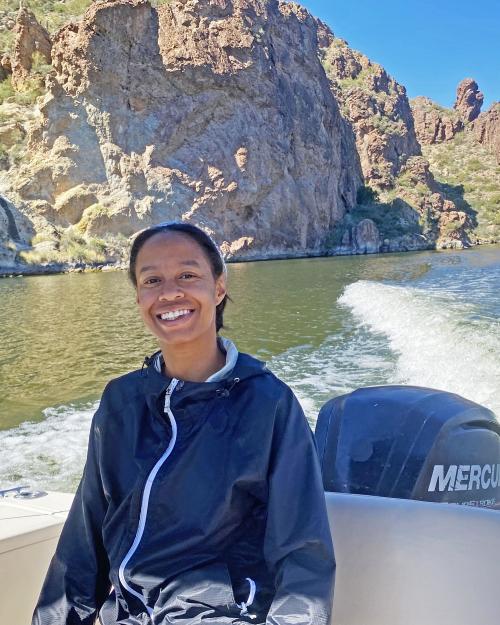
Foster now studies water quality in different bodies of water in the Phoenix area, including Tempe town lake, Saguaro Lake, and the Phoenix canals. She primarily assesses water quality by studying what species of algae grow in those bodies of water, where they grow, and how much of that algae might be harmful. That helps her make predictions about the consequences of algal blooms, which can release harmful toxins into the source of Phoenix’s drinking water, as well as the water that many residents fish and recreate in.
The city of Phoenix performs certain water quality tests several times a year, but Foster believes they could be doing even more: “[The city is] sampling to get seasonal changes, which is super important, but I also think the frequency of sampling needs to increase in the future.”
Foster hopes her research can help fill an important gap that the city has not addressed, and push for more regular water monitoring across the US, rather than only monitoring after a crisis like Flint has happened. Additionally, Foster hopes that she can become a trusted source of environmental quality information for local communities –– a role that she sees science and government as sorely lacking.
“Growing up in Black communities, I know there’s a lot of distrust about anything the government says, especially related to the health of the environment we’re living in. There’s been so many atrocities of the government allowing water sources and air sources to be heavily polluted and saying zilch to people, like at Cancer Alley and Love Canal. And so, I know it’s important to establish myself as a trustworthy source for environmental knowledge.”
Foster has done her fair share of community advocacy work already. In the past, she’s served as the Diversity, Equity, and Inclusion Representative for the School of Life Sciences’ graduate student government. She’s also a member of Earth Systems Science for the Anthropocene graduate scholars network, which brings together scholars who are studying science to bring solutions to people, and who value inclusion and justice. Foster participated in a Salt River History project with ESSA, which brought together diverse forms of knowledge about the Salt River to educate local people and advocate for creating a healthier river ecosystem in the future.
